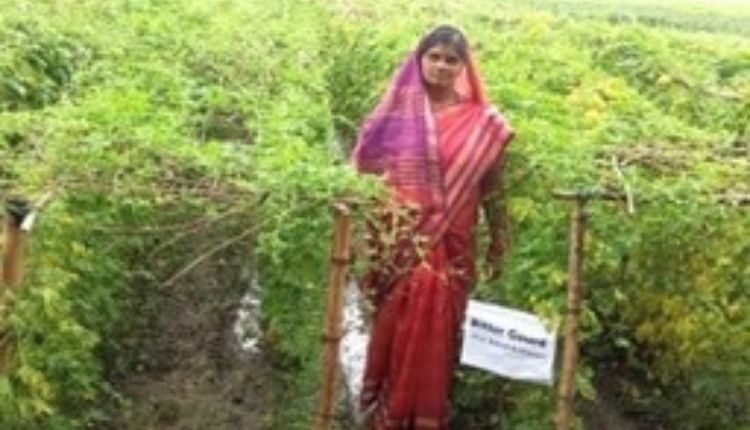Women In Tribal Farming: Role of tribal women in farming and contribution in seed conservation
Women in tribal society (Women in Tribal Farming) are considered the backbone of farming. They are actively involved in all stages such as land preparation, sowing, weeding, harvesting and crop management. Their hard work and dedication meet the food requirements of the families and also ensure supply in the local markets.
Tribal women (Women in Tribal Farming) are the unseen heroines of Indian agriculture, who have been playing a vital role in farming, seed conservation and food security for generations. Their traditional knowledge and sustainable agricultural practices not only ensure the livelihood of their communities but also contribute to biodiversity and environmental conservation.
According to the Agricultural Census, 73.2% of rural women are engaged in agricultural activities. Only 8 percent of women own land.
Role of Tribal Women in Agriculture
Women in Tribal Society (Women in Tribal Farming) are considered the backbone of farming. They are actively involved in all stages of land preparation, sowing, weeding, harvesting and crop management. Their hard work and dedication fulfills the food requirements of the families and also ensures supply in the local markets.
For example, according to a report by the Indian Council of Agricultural Research (ICAR), tribal women work an average of 158 days per year for forest products, earning them an income of Rs 150 per day.
Whenever there is any discussion about agriculture in the country, men are thought of as farmers. Women are excluded from the definition of farmers because their names are not registered as owners of agricultural land. Tribal women farmers are deprived of the benefits of all government schemes as per the rules due to lack of recognition as farmers.
The government also recognizes women as ‘helpers in agricultural work’ or ‘agricultural laborers’ and does not give them recognition and facilities as farmers.
Women Who Have Achieved Success In Agriculture Through Their Hard Work
Ruby Pareek is a resident of Dausa district of Rajasthan. Who adopted organic farming. Ruby Pareek started organic farming on her land according to the season. She has grown many crops like wheat, gram, amla, lemon and karonda, which not only keep her fields green but are also beneficial for her organic farm. Along with this, she also grows other types of crops like green chillies, tomatoes, brinjal, and radish in an organic way.
At the same time, women associated with the FPO of Varanasi produced oyster mushrooms. The scientists were also happy to see their bumper yield. Marketing was done through the Indian Vegetable Research Institute, Varanasi. A group of 16 women earned an income of Rs 25,300 from mushroom production after domestic use of seeds from October 2021 to February 2022.
Contribution To Seed Conservation
Seed conservation is an important responsibility of tribal women. They save traditional seeds and keep them safe for the next generation, thereby maintaining the diversity of agriculture. Padma Shri awardee Rahibai Popere is doing organic farming on more than 50 acres of land through Self Help Group (SHG). In this, she is growing more than 17 crops. Rahibai Soma Popere is also known as ‘Seed Mother’.
57-year-old Rahibai, a resident of the small Komble village of Ahmednagar district of Maharashtra, is a tribal farmer. Rahibai started collecting such indigenous seeds, which only need water and air to grow. These seeds do not require chemicals and pesticides.
Kudeladu Jani, a tribal woman from Kandhamal district of Odisha, has been preserving traditional seeds for two decades. They believe that these seeds are invaluable as they do not require any chemicals, are nutritious and protect the traditional agricultural knowledge of the community.
The Role Of Women In Food Security
Tribal women also play an important role in ensuring food security. They cultivate traditional crops that are rich in nutrients and are suitable for the local climate. For example, Sadhna Tiwari, a resident of Madhavgarh village in Satna district of Madhya Pradesh, is a progressive woman farmer who not only made herself successful by adopting organic and natural farming but also became a source of inspiration for other farmers.
Sadhna not only adopted organic farming on a commercial level on 11 to 15 acres of land but also established it as a healthy and sustainable agricultural method. Today, she grows several crops like rice, vegetables, and fruits in her farm using organic methods.
Chikka Mahadevamma of Mandya district of Karnataka has studied only till seventh standard, but she has made the rain-dependent dry land green again. Chikka Mahadevamma does completely organic farming on her 4 acres of land, in which she cultivates many types of crops.
Challenges and Solutions
However, tribal women face many challenges, such as lack of land rights, unavailability of resources and lack of technical knowledge. Government and NGOs should provide these women with training, financial support and access to markets so that they can further strengthen their agricultural practices.
Tribal women are the precious heritage of Indian agriculture. Their traditional knowledge, seed conservation and sustainable agricultural practices are extremely important for the food security and biodiversity of our country. It is important that we recognize their contribution and take concrete steps to empower them.
Contact us- If farmers want to share any valuable information or experiences related to farming, they can connect with us via phone or whatsApp at 9599273766 or you can write to us at [email protected]. Through Kisan of India, we will convey your message to the people, because we believe that if the farmers are advanced then the country is happy.



